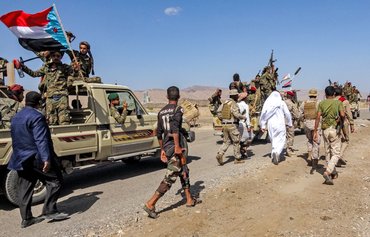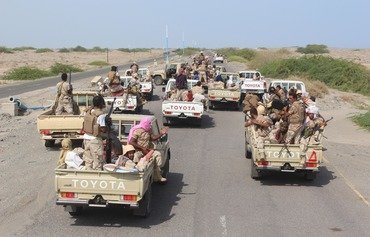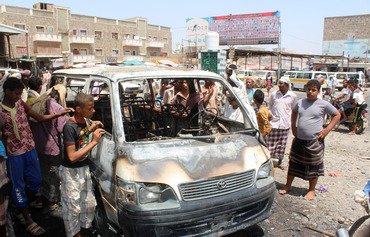Al-Qaeda’s resumption of terror activities in Yemen's southern province of Abyan comes as a result of the unstable security situation it has exploited to its advantage, observers told Al-Mashareq.
This recent resurgence in malign activity also can be attributed to the financial support the group receives from various sources -- including Iran, they said.
The Islamic Revolutionary Guard Corps (IRGC) has strong ties with al-Qaeda, as evidenced by Iran’s hosting of a large number of al-Qaeda elements on the run from international security authorities, experts said.
The IRGC is also one of the key backers of Yemen's Houthis (Ansarallah), they said, noting that its support for the militia has protracted the war and created the conditions in which extremist groups such as al-Qaeda can flourish.
Al-Qaeda's activities in Yemen had declined since March 2015, when Yemeni forces backed by the Arab coalition ousted the group from all the areas it had seized as part of Operation Resolute Storm.
These included the Hadramaut provincial capital of al-Mukalla and a number of districts in the southern provinces of Abyan and Shabwa.
The battle is not over
"The resumption of some of al-Qaeda’s activities, including the targeting of a number of security checkpoints in Abyan province, demonstrates that the battle against al-Qaeda is not yet over," said Saeed al-Jamahi, who specialises in the affairs of extremist groups.
This is evident, he said, "even though the successes achieved in targeting the group managed to put it in a situation that is the worst it has seen in years".
Of the resumption of the group’s activities, specifically in Abyan's Ahwar and Lawdar districts, al-Jamahi told Al-Mashareq that this was expected.
Those areas are considered the most important "incubators for the group", he said, as this is where it established its small and short-lived "state".
"I think the situation in the country, with all its complications, does not inspire hope for a real elimination of terrorist groups," he said. "This requires a cohesive, strong and stable environment, which does not exist in [Yemen] at this time."
Al-Jamahi said he believes the situation will "continue to oscillate between non-comprehensive successes and limited occurrences of terrorist attacks".
"Al-Qaeda will settle for achieving limited threats to prove its existence and create more chaos," he said, adding that it will be difficult, however, for the group to get back to the strong level of activity it maintained in the past.
"The complete elimination of al-Qaeda can only be achieved with the existence of a politically, economically and socially stable state that is capable of combating extremist ideology, not only militarily but in all areas in which extremism and radicalism can grow," al-Jamahi said.
Exploiting Yemen's instability
Al-Qaeda in recent years has been the target of an organised war directed against it by Yemeni forces that reined it in and decimated its ranks, political analyst Waddah al-Jalil told Al-Mashareq.
Many of its camps and areas of influence in Abyan, Shabwa and Hadramaut were targeted, he said, noting that more recently the group has taken advantage of the national instability to regroup and relaunch itself.
"Having come under numerous strikes that destroyed its bases, killed many of its elements and made it lose areas that were under its control, the group has perhaps managed to regroup," he said.
"There are vast spaces, remote areas and mountains in which it could take refuge, not to mention the return of its sources of funding," he said.
Political instability and a lack of security coverage in the southern provinces has allowed al-Qaeda to reband, al-Jalil said, "and this has left security gaps that allowed the group to form cells".
Al-Qaeda seeks to regroup, establish new training camps, train its fighters and ultimately carry out new attacks, he added.
Al-Jalil warned against allowing al-Qaeda to regenerate itself, especially as the southern provinces have not been able to establish enough stability to contain the group.
"After the Yemeni army declared that it had defeated the group and expelled it from most of the areas in which it had a presence, al-Qaeda took advantage of the protracted war to acquire money and weapons," said Adel Al-Shujaa, a member of the General Committee of the General People's Congress.
Al-Qaeda's objective in attacking security checkpoints is to turn the table on the legitimate government and make it appear as a failure, he told Al-Mashareq.

![A crater is seen in the ground as Yemeni government forces walk in Zinjibar, the capital of Abyan province on August 16th, 2016 following an offensive to recapture the city from al-Qaeda extremists. [Saleh al-Obeidi/AFP]](/cnmi_am/images/2018/09/19/14541-yemen-abyan-aq-600_384.jpg)






